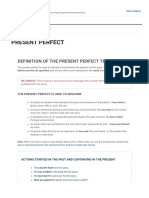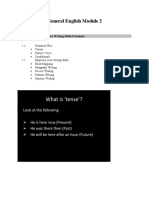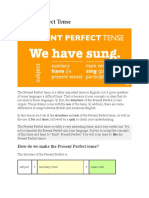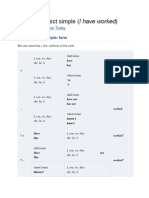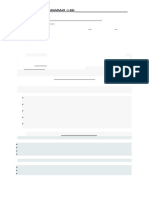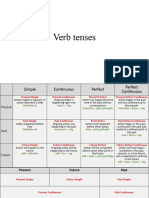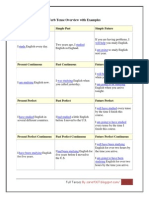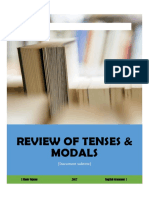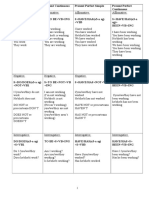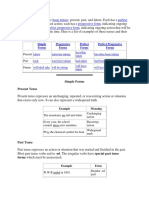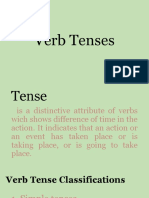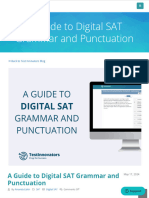The Future Continuous
The Future Continuous
Uploaded by
Andre AndrianCopyright:
Available Formats
The Future Continuous
The Future Continuous
Uploaded by
Andre AndrianCopyright
Available Formats
Share this document
Did you find this document useful?
Is this content inappropriate?
Copyright:
Available Formats
The Future Continuous
The Future Continuous
Uploaded by
Andre AndrianCopyright:
Available Formats
The Future Continuous
The future continuous tense, sometimes also referred to as the future progressive tense, is a
verb tense that indicates that something will occur in the future and continue for an expected
length of time. It is formed using the construction will + be + the present participle (the root
verb + -ing).
The simple future tense is a verb tense that is used when an action is expected to occur in the
future and be completed. For example, let’s suppose you have a meeting tomorrow at five
o’clock.
I will arrive at five o’clock.
I will arrive is the simple future tense of the verb to arrive. You arrive once; beyond that, you
can’t keep on arriving. However, once you get there, you may be doing something that goes
on continuously, at least for a certain period of time.
At five o’clock, I will be meeting with the management about my raise.
Will be meeting is the future continuous tense of the verb to meet. The construction will + be
+ the present participle meeting indicates that the meeting isn’t going to happen in an instant,
all at once. It will have a duration. The will + be + present participle construction always
indicates the future continuous tense.
Michael will be running a marathon this Saturday.
Eric will be competing against Michael in the race.
I will be watching Michael and Eric race.
The Future Continuous Tense Is for Action Verbs Only
It is important to note that the future continuous tense is only used with action verbs, because
it is possible to do them for a duration. (Action verbs describe activities like running,
thinking, and seeing. Stative verbs describe states of existence, like being, seeming, and
knowing.) To use the will + be + present participle construction with a stative verb would
sound very odd indeed.
I will be being stressed tomorrow during my science test.
I will be stressed tomorrow during my science test.
When the sun comes out tomorrow, winter will be seeming like a distant memory.
When the sun comes out tomorrow, winter will seem like a distant memory.
After I study, I will be knowing all the answers for the test.
After I study, I will know all the answers for the test.
Past perfect tense
Functions of the past perfect
The past perfect refers to a time earlier than before now. It is used to make it clear that one
event happened before another in the past. It does not matter which event is mentioned first
- the tense makes it clear which one happened first.
In these examples, Event A is the event that happened first and Event B is the second or more
recent event:
Event A Event B
John had gone out when I arrived in the office.
Event A Event B
I had saved my document before the computer crashed.
Event B Event A
When they arrived we had already started
cooking.
Event B Event A
He was very tired because he hadn't slept well.
Forming the past perfect
The Past Perfect tense in English is composed of two parts: the past tense of the verb to have
(had) + the past participle of the main verb.
Subjec had past participle
t
Affirmative
She had given
Negative
She hadn't asked.
Interrogative
Had they arrived?
Interrogative Negative
Hadn't you finished?
To decide, past perfect
Affirmative Negative Interrogative
I had decided I hadn't decided Had I decided?
You had decided You hadn't decided Had you decided?
She had decided She hadn't decided Had she decided?
We had decided We hadn't decided Had we decided?
They had decided They hadn't Had they
decided decided?
Past perfect + just
'Just' is used with the past perfect to refer to an event that was only a short time earlier than
before now, e.g.
The train had just left when I arrived at the station.
She had just left the room when the police arrived.
I had just put the washing out when it started to rain.
Present Perfect Tense
Definition of the present perfect tense
The present perfect is used to indicate a link between the present and the past. The time of the
action is before now but not specified, and we are often more interested in the result than in
the action itself.
BE CAREFUL! There may be a verb tense in your language with a similar form, but the meaning is
probably NOT the same.
The Present Perfect is used to describe
An action or situation that started in the past and continues in the present. I have lived in
Bristol since 1984 (= and I still do.)
An action performed during a period that has not yet finished. She has been to the cinema
twice this week (= and the week isn't over yet.)
A repeated action in an unspecified period between the past and now. We have visited
Portugal several times.
An action that was completed in the very recent past, expressed by 'just'. I have just finished
my work.
An action when the time is not important. He has read 'War and Peace'. (= the result of his
reading is important)
Note: When we want to give or ask details about when, where, who, we use the simple past.
Read more about choosing between the present perfect and the simple past tenses.
Actions started in the past and continuing in the present
They haven't lived here for years.
She has worked in the bank for five years.
We have had the same car for ten years.
Have you played the piano since you were a child?
When the time period referred to has not finished
I have worked hard this week.
It has rained a lot this year.
We haven't seen her today.
Actions repeated in an unspecified period between the past and now.
They have seen that film six times
It has happened several times already.
She has visited them frequently.
We have eaten at that restaurant many times.
Actions completed in the very recent past (+just)
Have you just finished work?
I have just eaten.
We have just seen her.
Has he just left?
When the precise time of the action is not important or not known
Someone has eaten my soup!
Have you seen 'Gone with the Wind'?
She's studied Japanese, Russian, and English.
Read more about using the present perfect with the words "ever", "never", "already", and
"yet", and about using the present perfect with the words "for" and "since".
Forming the Present Perfect
The present perfect of any verb is composed of two elements : the appropriate form of the
auxiliary verb to have (present tense), plus the past participle of the main verb. The past
participle of a regular verb is base+ed, e.g. played, arrived, looked. For irregular verbs, see
the Table of irregular verbs in the section called 'Verbs'.
Affirmative
Subject to have past participle
She has visited.
Negative
Subject to have + not past participle
She has not (hasn't) visited.
Interrogative
to have subject past participle
Has she visited?
Negative interrogative
to have + not subject past participle
Hasn't she visited?
To Walk, present perfect
Affirmative Negative Interrogative
I have walked I haven't walked Have I walked?
You have walked You haven't walked. Have you walked?
He, she, it has walked He, she, hasn't walked Has he, she, it walked?
We have walked We haven't walked Have we walked?
You have walked You haven't walked Have you walked?
They have walked They haven't walked Have they walked?
The future perfect Tense
The future perfect is composed of two elements
the simple future of the verb "to have" (will have) + the past participle of the main verb
Subjec + will have + past participle of the main verb
t
He will have finished.
I will have finished.
To arrive, future perfect tense
Affirmative Negative Interrogative Negative Interrogative
I will have arrived I won't have arrived Will I have arrived? Won't I have arrived?
You will have arrived You won't have arrived Will you have arrived? Won't you have arrived?
He will have arrived He won't have arrived Will he have arrived? Won't he have arrived?
We will have arrived We won't have arrived Will we have arrived? Won't we have arrived?
They will have They won't have Will they have Won't they have
arrived arrived arrived? arrived?
Function
The future perfect tense refers to a completed action in the future. When we use this tense we
are projecting ourselves forward into the future and looking back at an action that will be
completed some time later than now. It is most often used with a time expression.
Examples
I will have been here for six months on June 23rd.
By the time you read this I will have left.
You will have finished your report by this time next week.
Won't they have arrived by 5:00?
Will you have eaten when I pick you up?
You might also like
- ESL - English as a Second Language - Verbs: a QuickStudy Digital Reference GuideFrom EverandESL - English as a Second Language - Verbs: a QuickStudy Digital Reference GuideNo ratings yet
- Present PerfectDocument26 pagesPresent Perfectjithmi bhavaniNo ratings yet
- Perfect Tenses: by Salsabila Naqiyyah Xiia1Document13 pagesPerfect Tenses: by Salsabila Naqiyyah Xiia1Salsabila NaqiyyahNo ratings yet
- Present Perfect TenseDocument9 pagesPresent Perfect TenseHizkiel SembiringNo ratings yet
- Present Perfect TenseDocument13 pagesPresent Perfect TenseEstuardoRodasNo ratings yet
- Present Perfect TenseDocument2 pagesPresent Perfect Tensepriyonoz DarmantozNo ratings yet
- Present Perfect TenseDocument9 pagesPresent Perfect TenseDost Jan100% (1)
- Definition of The Present Perfect TenseDocument14 pagesDefinition of The Present Perfect TenseWaad AlteeNo ratings yet
- 2 - Tenses-Part1Document56 pages2 - Tenses-Part1drlalbihariNo ratings yet
- Affirmative Negative Interrogative Form: Simple PresentDocument5 pagesAffirmative Negative Interrogative Form: Simple PresentyvbamuNo ratings yet
- Present Perfect - English Grammar - EFDocument4 pagesPresent Perfect - English Grammar - EFManuel DalelinoNo ratings yet
- Definition of The Present Perfect TenseDocument4 pagesDefinition of The Present Perfect TenseZizouNo ratings yet
- Present Perfect To Future Perfect ContinuousDocument7 pagesPresent Perfect To Future Perfect ContinuousFiona FedericoNo ratings yet
- Present Perfect-Wps OfficeDocument3 pagesPresent Perfect-Wps OfficeRohma FidaNo ratings yet
- INGLÊS - Alguns ApontamentosDocument30 pagesINGLÊS - Alguns ApontamentosNídia PizaNo ratings yet
- Materi B InggrisDocument4 pagesMateri B InggrisariNo ratings yet
- Explanations of TensesDocument10 pagesExplanations of TensesNalin Hettiarachchi100% (1)
- Bba Bcom Tenses NotesDocument8 pagesBba Bcom Tenses NotesAnil Shenoy KNo ratings yet
- Simple Present - Present ProgressiveDocument11 pagesSimple Present - Present Progressivebenmehel abdelkrimNo ratings yet
- Grammar Medical PDFDocument38 pagesGrammar Medical PDFCindy AmeLiyana Part IINo ratings yet
- Definition of The Present Perfect TenseDocument20 pagesDefinition of The Present Perfect TenseSelebriti Rafiq ChikidotNo ratings yet
- Present Perfect: Than in The Action ItselfDocument3 pagesPresent Perfect: Than in The Action ItselfjosueNo ratings yet
- Tenses Simple Present: Forma: VerbDocument8 pagesTenses Simple Present: Forma: VerbFlorencia MaccaroneNo ratings yet
- Simple Past vs. Present PerfectDocument16 pagesSimple Past vs. Present PerfectAnnisa Nurul HanifahNo ratings yet
- Present Past PDFDocument41 pagesPresent Past PDFIrmaaNo ratings yet
- VerbsDocument29 pagesVerbsjhasminvalencia85No ratings yet
- Simple Present: He Wants, She Needs, He Gives, She ThinksDocument10 pagesSimple Present: He Wants, She Needs, He Gives, She ThinksAisyah RasdiNo ratings yet
- GrammarDocument73 pagesGrammarFemina MadhuNo ratings yet
- TensesDocument43 pagesTensesbajwalakhbir108No ratings yet
- Present Perfect SimpleDocument5 pagesPresent Perfect SimpleBondfriendsNo ratings yet
- Present Perfect SimpleDocument7 pagesPresent Perfect SimpleDalen NorwayNo ratings yet
- Grammar Tenses ReportDocument13 pagesGrammar Tenses ReportAlberto Emiliano Montoya OlivoNo ratings yet
- Perfectul Prezent Simplu (Present Perfect)Document19 pagesPerfectul Prezent Simplu (Present Perfect)eu_tu_23100% (1)
- PerfectoDocument4 pagesPerfectoAri reyesNo ratings yet
- Tugas Kel9Document8 pagesTugas Kel9pingkananggun19No ratings yet
- CH 3 Present Perfect Vs Present Perfect ContinuousDocument28 pagesCH 3 Present Perfect Vs Present Perfect ContinuousIndra WijayaNo ratings yet
- Present PerfectDocument9 pagesPresent PerfectOmar AchirNo ratings yet
- Review of English TensesDocument8 pagesReview of English TensesSyifaa' NajibNo ratings yet
- Uses of The Perfect InfinitiveDocument24 pagesUses of The Perfect InfinitivemiraeNo ratings yet
- General English Module 2Document39 pagesGeneral English Module 2shambhavi sinhaNo ratings yet
- Definition of The Present Perfect TenseDocument7 pagesDefinition of The Present Perfect Tensemounib khaddourNo ratings yet
- Present Perfect Tense PDFDocument3 pagesPresent Perfect Tense PDFelenapet1No ratings yet
- Present Perfect TenseDocument11 pagesPresent Perfect TenseDo Huynh Khiem CT20V1Q531No ratings yet
- I. ENGLISH VERB-WPS OfficeDocument20 pagesI. ENGLISH VERB-WPS OfficeAlyn sultanNo ratings yet
- Present Perfect Simple (I Have Worked) : English Grammar TodayDocument26 pagesPresent Perfect Simple (I Have Worked) : English Grammar TodayEurico BrassoNo ratings yet
- I Think There'd Be A Lot of Children Who'd Love To Have A Climbing Wall in SchoolDocument11 pagesI Think There'd Be A Lot of Children Who'd Love To Have A Climbing Wall in SchoolEmil FejzagićNo ratings yet
- Grammar -1-BB- Present Perfect Verb TenseDocument3 pagesGrammar -1-BB- Present Perfect Verb TenseFayza 1008No ratings yet
- 16 TensesDocument18 pages16 TensesAnonymous eCws3ENo ratings yet
- GrammarDocument3 pagesGrammara28h81No ratings yet
- Present PerfectDocument59 pagesPresent PerfectAlejandro PrezaNo ratings yet
- Past Perfect and Present PerfectDocument20 pagesPast Perfect and Present PerfectLaura PeñaNo ratings yet
- Present Perfect and Past Simple.Document2 pagesPresent Perfect and Past Simple.Ivan Orantos del OlmoNo ratings yet
- Clase de InglesDocument17 pagesClase de InglesByron Bermello ToalaNo ratings yet
- Deysi CCDocument11 pagesDeysi CCSñrta Yary SCNo ratings yet
- Verb TensesDocument20 pagesVerb Tensesvpetrovaa23No ratings yet
- Group 4purposive CommunicationDocument19 pagesGroup 4purposive Communicationbmiranda.stiNo ratings yet
- Tense Signal Words Use Form Examples Affirmative Examples Negative Examples InterrogativeDocument7 pagesTense Signal Words Use Form Examples Affirmative Examples Negative Examples InterrogativeJitendra PatilNo ratings yet
- English Grammar Oxford Learn 4HAVODocument25 pagesEnglish Grammar Oxford Learn 4HAVOThijs van der KleinNo ratings yet
- Verb TensesDocument10 pagesVerb TensesSergioNanínMartínezNo ratings yet
- TensesDocument5 pagesTensesرضوان الياسريNo ratings yet
- Практическая грамматика английского языкаDocument244 pagesПрактическая грамматика английского языкаКристина ПустоваловаNo ratings yet
- Simple Present TenseDocument11 pagesSimple Present TenseUmah Devi MuthiahNo ratings yet
- English 5 Q.2 Module 3Document5 pagesEnglish 5 Q.2 Module 3Ma.Theresa A. ApostolNo ratings yet
- Third EditionDocument140 pagesThird EditionGulnaz AteeqNo ratings yet
- Full Tenses PDFDocument40 pagesFull Tenses PDFsarief100% (2)
- VERBDocument8 pagesVERBjasmine anguloNo ratings yet
- Literacy: Present, Past and Future TenseDocument6 pagesLiteracy: Present, Past and Future TenseHello Smart Kids TVNo ratings yet
- Exam Correction FinalDocument34 pagesExam Correction FinalMistyNo ratings yet
- Present SimpleDocument116 pagesPresent Simplekpmadhun100% (1)
- Modul 2 - Review of Tenses and Contrast of Two TensesDocument44 pagesModul 2 - Review of Tenses and Contrast of Two Tensesaulia salsabilaNo ratings yet
- At The Zoo - T2-TensesDocument3 pagesAt The Zoo - T2-TensesROSHIDA AZIZNo ratings yet
- Exercise On Verbs Sn1Document12 pagesExercise On Verbs Sn1Maiyhurri GunasekaranNo ratings yet
- 2nd Q WEEKLY LEARNING PLAN W2 M1 gr.5 ENG.Document5 pages2nd Q WEEKLY LEARNING PLAN W2 M1 gr.5 ENG.Leceil Oril PelpinosasNo ratings yet
- 100 Clear Grammar Tests - Reproducible Grammar TestsDocument220 pages100 Clear Grammar Tests - Reproducible Grammar TestscamibmichelNo ratings yet
- Compound SentenceDocument44 pagesCompound SentenceNada DimitrijevicNo ratings yet
- C. PaidosDocument116 pagesC. Paidoshaldanmihaela50% (2)
- Aspects of VerbDocument2 pagesAspects of VerbLolitaNo ratings yet
- Past, Present and Future Tense: VerbsDocument26 pagesPast, Present and Future Tense: VerbsSergio PadillaNo ratings yet
- Principal Parts of The VerbsDocument30 pagesPrincipal Parts of The VerbsKiza Dampor-GuanteroNo ratings yet
- Basic Hindi I 1619720368Document330 pagesBasic Hindi I 1619720368MohanV100% (1)
- Grammar 3 ExpDocument2 pagesGrammar 3 ExpMuh Fauzan Adnan100% (2)
- Monograph Past Tense - Verb Forms, Conjugate MONOGRAPHDocument4 pagesMonograph Past Tense - Verb Forms, Conjugate MONOGRAPHRogerio Albino CanaeNo ratings yet
- 19 Verb Tenses - Correcting ShiftsDocument5 pages19 Verb Tenses - Correcting ShiftsKyrene DizonNo ratings yet
- Q2 WK 1 ENGLISHDocument47 pagesQ2 WK 1 ENGLISHchristina zapantaNo ratings yet
- Basic Tenses Perfect Form Progressive Form Perfect Progressive FormDocument4 pagesBasic Tenses Perfect Form Progressive Form Perfect Progressive FormsumitNo ratings yet
- English Grammar (Tenses)Document16 pagesEnglish Grammar (Tenses)yashudipak632010No ratings yet
- RUMUSDocument1 pageRUMUSHijjul HakimNo ratings yet
- Verb TensesDocument35 pagesVerb TensesGlaiza VillaverNo ratings yet
- A Guide To Digital SAT Grammar and Punctuation - Test InnovatorsDocument30 pagesA Guide To Digital SAT Grammar and Punctuation - Test InnovatorsEdefo Izogie-EgheNo ratings yet
- Mentors' Grammar BookDocument177 pagesMentors' Grammar Bookkazihedayet570No ratings yet










